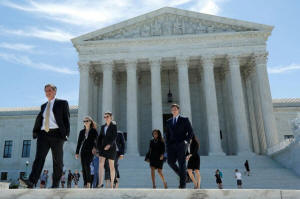|
Appeals court lets Trump travel ban go
partially into effect
 Send a link to a friend
Send a link to a friend
[November 14, 2017]
By Lawrence Hurley
WASHINGTON (Reuters) - A U.S. appeals court
in California on Monday let President Donald Trump's latest travel ban
go partially into effect, ruling the government can bar entry of people
from six Muslim-majority countries with no connections to the United
States.
A three-judge panel of the San Francisco-based 9th U.S. Circuit Court of
Appeals partially granted a Trump administration request to block at
least temporarily a judge's ruling that had put the new ban on hold.
Trump's ban was announced on Sept. 24 and replaced two previous versions
that had been impeded by federal courts.
The action means the ban will apply to people from Iran, Libya, Syria,
Yemen, Somalia and Chad who do not have connections to the United
States.
Those connections are defined as family relationships and "formal,
documented" relationships with U.S.-based entities such as universities
and resettlement agencies. Those with family relationships that would
allow entry include grandparents, grandchildren, brothers-in-law,
sisters-in-law, aunts, uncles, nieces, nephews and cousins of people in
the United States.
"We are reviewing the court's order and the government will begin
enforcing the travel proclamation consistent with the partial stay. We
believe that the proclamation should be allowed to take effect in its
entirety," Justice Department spokeswoman Lauren Ehrsam said.
The state of Hawaii, which sued to block the restrictions, argued that
federal immigration law did not give Trump the authority to impose them
on six of those countries. The lawsuit did not challenge restrictions
toward people from the two other countries listed in Trump's ban, North
Korea and Venezuela.
U.S. District Judge Derrick Watson in Honolulu ruled last month that
Hawaii was likely to succeed with its argument.
Hawaii Attorney General Douglas Chin said the court's decision tracked
what the Supreme Court said in June when it partially revived Trump's
second travel ban, which has now expired.
"I'm pleased that family ties to the U.S., including grandparents, will
be respected," Chin added.
Separately on Monday, a group of refugee organizations and individuals
filed a lawsuit in Seattle federal court challenging Trump's decision to
suspend entry of refugees from 11 countries, nine of which are majority
Muslim, for at least 90 days.
[to top of second column] |

People walk out after the U.S. Supreme Court granted parts of the
Trump administration's emergency request to put his travel ban into
effect immediately while the legal battle continues, in Washington,
U.S., June 26, 2017. REUTERS/Yuri Gripas/File Photo

Trump issued his first travel ban targeting several Muslim-majority
countries in January, just a week after he took office, and then
issued a revised one after the first was blocked by the courts. The
second one expired in September after a long court fight and was
replaced with another revised version.
Trump has said the travel ban is needed to protect the United States
from terrorism by Muslim militants. As a candidate, Trump had
promised "a total and complete shutdown of Muslims entering the
United States."
Critics of the travel ban in its various iterations call it a
"Muslim ban" that violates the U.S. Constitution by discriminating
on the basis of religion.
The 9th Circuit is due to hear oral arguments in the case on Dec. 6.
In a parallel case from Maryland, a judge also ruled against the
Trump administration and partially blocked the ban from going into
effect.
An appeal in the Maryland case is being heard on Dec. 8 by the 4th
U.S. Circuit Court of Appeals in Richmond, Virginia. The Maryland
case was brought by the American Civil Liberties Union, which
represents several advocacy groups, including the International
Refugee Assistance Project.
(Reporting by Lawrence Hurley in Washington; Additional reporting by
Dan Levine in San Francisco; Editing by Will Dunham and Tom Brown)
[© 2017 Thomson Reuters. All rights
reserved.]
Copyright 2017 Reuters. All rights reserved. This material may not be published,
broadcast, rewritten or redistributed. |